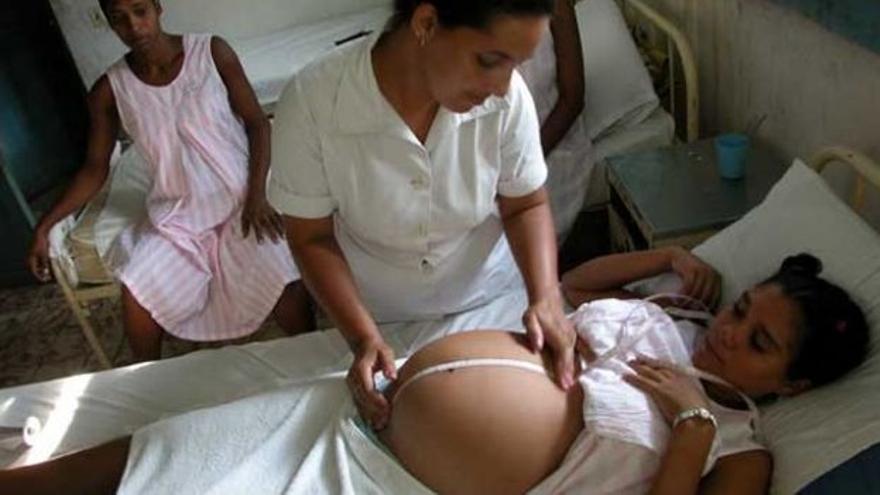
![]() 14ymedio, Havana, 19 July 2023 — The Cuban Parliament reported on Tuesday that in the first half of 2023 there were 7,953 pregnancies corresponding to women between 12 and 19 years of age, out of a total of 41,761 reported nationally. The situation is more worrying in the rural context, where, say the deputies, early mothers have a specific profile: poor, black and out of work.
14ymedio, Havana, 19 July 2023 — The Cuban Parliament reported on Tuesday that in the first half of 2023 there were 7,953 pregnancies corresponding to women between 12 and 19 years of age, out of a total of 41,761 reported nationally. The situation is more worrying in the rural context, where, say the deputies, early mothers have a specific profile: poor, black and out of work.
The figure, which represents 18.9% of the total number of pregnant women in the country so far this year, exceeds by 291 (3.7%) the 7,662 early pregnancies of the same period in 2022. If the cases are analyzed by province, the percentage is even more alarming; 22.7% of those born in Las Tunas are born to underage mothers, while in Camagüey the number is 21.4%, in Granma, 20.4% and, in Holguín, 20.3%.
For Arelys Santana Bello, president of the Parliament’s Youth Care Committee, “social factors” intervene in the upturn of precocity. In the Cuban countryside, it is common for a minor to feel forced to have children, either to get out of poverty – if the father is able to respond economically for the child and his mother – or to emigrate, if the father is a foreigner.
“In the places visited by the deputies, mestizo and black adolescents, living in rural environments, detached from study and work, in low-income homes and in precarious conditions, were more prone to early pregnancies,” she explained.
There are other social factors that affect the problem, such as lack of access to sexual and reproductive health services, Santana said. The official also mentioned the “influence of gender inequities,” which limit the woman’s decision to terminate a pregnancy.
She also regretted that, although educational and social communication actions are “prioritized,” these are “insufficient” due to the complexity involved in convincing rural minors to “adopt responsible behaviors.”
Adolescents resort less to the use of contraceptive methods than adult women, she said, leaving in the background the low availability of these supplies in the Island’s pharmacies.
In Cuba, teenage pregnancies not only have serious consequences for women’s health but also have a profound socioeconomic impact on families. After pregnancy, many young women are pressured to get married and have children, reducing their access to higher education or a decent job. On many occasions, the children end up being raised by grandparents.
The solutions to this problem that Parliament raised on Tuesday once again focus on the promotion and education of sexual health through the media and on the promise of strengthening the 168 municipal family planning services by adding staff and renewing the supply of contraceptives.
The deputies also proposed that emphasis should be on the continuity of studies for pregnant adolescents, who usually see their educational process interrupted. Similarly, it was proposed to create a maternal home in each municipality that doesn’t have this type of center.
Yamila González Ferrer, vice president of the Union of Jurists of Cuba, added that the issue is also legally complex. Marriage between a minor – usually a girl – and an adult remains, under Cuban law, a crime: “It is a crime of rape, because she is a minor. We need our doctors and teachers to be trained,” she concluded.
She also criticized the fact that, often, it is the parents of the teenager who encourage the relationship with older men and early pregnancy, despite the fact that voluntary interruption is legal.
For his part, Antonio Aja Díaz, director of the Center for Demographic Studies of the University of Havana, pointed out that fertility in Cuba has been decreasing in the last five decades. After the baby boom in 1960, the number of pregnancies began to decline, beginning in 1978. Currently, the general fertility rate on the Island is 1.4 children for each woman of childbearing age (15-49 years old), a figure that Aja relates to the indicators of developed countries and that he does not hesitate to attribute to the “policies of the Revolution.”
Commenting on the increase in the number of pregnant minors, Aja could not sustain his optimism and agreed with Santana and González: the alarming situation is a reflection of the “social problems” of Cuban families.
Translated by Regina Anavy
____________
COLLABORATE WITH OUR WORK: The 14ymedio team is committed to practicing serious journalism that reflects Cuba’s reality in all its depth. Thank you for joining us on this long journey. We invite you to continue supporting us by becoming a member of 14ymedio now. Together we can continue transforming journalism in Cuba.
